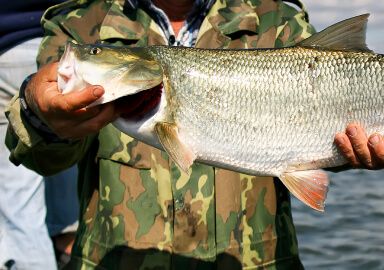Sultan Fish
Legend has it that only sultans once enjoyed the privilege of eating this fish. Whether it’s true or not, the sultan fish is undeniably a royal catch.
View 9 listings
9
listings
–
price starting from
1
countries
–
to the nearest trip
About Sultan Fish
The sultan fish (Leptobarbus hoevenii), also known as Hoven’s Carp and the Mad Barb, is a freshwater species native to Southeast Asia. A member of the barbel family, the sultan fish is revered for its striking appearance and delicate, highly prized flesh, making it a favorite among local anglers and chefs alike.
The sultan fish has a streamlined, torpedo-shaped body with silver and golden hues that shimmer in the sunlight, giving it a majestic appearance - another version of the origin of its royal name. These fish are typically found in rivers and lakes with clear, fast-flowing waters, where they use their impressive speed and agility to dart through the currents. Adults normally grow to lengths of 50 to 80 cm (20 to 31 in), and specimens over 1 meter have been recorded.
The sultan fish is primarily herbivorous, feeding on aquatic plants, algae, and occasionally small invertebrates. It’s known for its strength and resilience, offering a challenge to anglers, especially in faster-flowing rivers. Their delicate flesh and mild flavor make sultan fish highly sought after in the culinary world, making them a prized catch not just for sport but also for the table. Anglers fishing in stocked ponds need not constrain themselves, but those fortunate enough to catch a sultan fish in its natural habitat are encouraged to consider catch-and-release.
How to Catch?
Catching sultan fish requires patience, as they are primarily herbivores and can be selective feeders. One of the most effective methods is bait fishing with natural plant-based baits such as bread, dough balls, or corn. They are also known to take small insects and larvae, so fishing with maggots or worms can sometimes yield results.
Float fishing is popular for targeting sultan fish, especially in calm stretches of rivers and lakes. Present your bait near aquatic vegetation or drop-offs where the fish are likely to be feeding. Lightweight spinning tackle is typically used, and setting the hook quickly is important as sultan fish can be quick to nibble and swim off.
Fly fishing for sultan fish has also gained popularity in recent years, particularly in clear rivers with slower currents. Using small, nymph-like flies or even green algae imitations can be effective in attracting a strike. Sultan fish are powerful swimmers and can put up a strong fight, so be prepared for a thrilling battle once hooked. They are a regal prize for any angler, offering a combination of beauty, strength, and excellent eating quality.







